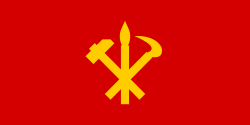4th Congress of the Workers' Party of Korea
 The flag of the Workers' Party of Korea | |
| Date | 11–18 September 1961 (7 days) |
|---|---|
| Location | Pyongyang, North Korea |
| Participants | 1,657 voting and 73 non-voting delegates |
| Outcome | 4th Central Committee and 4th Central Auditing Committee |
The 4th Congress of the Workers' Party of Korea (WPK), referred to by Kim Il Sung as the "Congress of Victors", was held in Pyongyang, North Korea, from 11 to 18 September 1961. The congress is the highest organ of the party, and is stipulated to be held every four years. 1,657 voting and 73 non-voting delegates represented the party's 1,311,563 members. The 4th Central Committee, elected by the congress, reelected Kim Il Sung as WPK Chairman, and a number of deputy chairmen.
Delegates
1,657 voting and 73 non-voting delegates were elected to represent the party's 1,311,563 members.[1] 32 different fraternal parties sent delegations to the 4th Congress, among these were the Communist Party of the Soviet Union (led by Frol Kozlov), the Chinese Communist Party (led by Deng Xiaoping), the Socialist Unity Party of Germany (led by Alfred Krehler) and the Japanese Communist Party (led by Kenji Miyamoto) among others.[2]
Congress
Kim Il Sung delivered a six-hour-long report on the work of the
On the congress' last day, amendments to the
The extent of Kim Il Sung's consolidation of power became clear to all with the election of the
1st plenum of the 4th Central Committee
The 1st Plenary Session of the 4th Central Committee convened on 18 September 1961 to elect the officers of the 4th Central Committee.
The Central Committee ranking list:[8]
- Kim Il Sung
- Choe Yong-gon
- Kim Il
- Pak Kum-chol
- Kim Chang-man
- Yi Hyo-sun
- Pak Chong-ae
- Kim Kwang-hyop
- Chong Il-yong
- Nam Il
- Yi Chong-ok
- Kim Ik-son
- Yi Chu-yon
- Ha Ang-chon
- Han Sang-du
- Chong Chun-taek
- So Chol
- Choe Hyon
- Sok San
- Kim Kyong-sok
Plenums of the 4th Central Committee
- 1st plenary session (18 September 1961)
- 2nd plenary session (27 November-1 December 1961)
- 3rd plenary session (6-8 March 1962)
- 4th plenary session (2-8 August 1962)
- 5th plenary session (10-14 December 1962)
- 6th plenary session (13-15 May 1963)
- 7th plenary session (3-5 September 1963)
- 8th plenary session (25-27 February 1964)
- 9th plenary session (25-26 June 1964)
- 10th plenary session (14-19 December 1964)
- 11th plenary session (29 June-1 July 1965)
- 12th plenary session (15-17 November 1965)
- 13th plenary session (28 March-4 April 1966)
- 14th plenary session (12 October 1966)
- 15th plenary session (4-8 May 1967)
- 16th plenary session (28 June-3 July 1967)
- 17th plenary session (22-25 April 1968)
- 18th plenary session (11-16 November 1968)
- 19th plenary session (27-30 June 1969)
References
Footnotes
Bibliography
- Suh, Dae-sook (1988). Kim Il Sung: The North Korean Leader (1st ed.). ISBN 0231065736.
Further reading
- Documents of the Fourth Congress of the Workers' Party of Korea. Pyongyang: OCLC 917056063.
